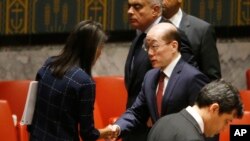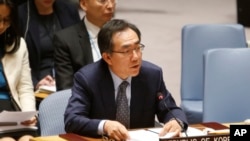The United Nations Security Council has unanimously adopted a tough new round of economic sanctions against North Korea in response to its September 3rd nuclear test of a possible hydrogen bomb.
“Today we are saying that the world will never accept a nuclear-armed North Korea,” U.S. Ambassador Nikki Haley told the council Monday evening. “And today the Security Council is saying that if the North Korean regime does not halt its nuclear program, we will act to stop it ourselves.”
Haley said the provisions in the resolution would drastically cut North Korea's ability to fund and fuel its nuclear and ballistic missile programs.
If fully implemented, the new sanctions would cut a third of North Korea's oil imports, which Haley called the “life blood” of its efforts to build and deliver a nuclear weapon.
'We are not looking for war'
The resolution will also reduce by more than half, the country's gas, diesel and heavy fuel oil imports, while completely banning the import of natural gas and other oil substitutes.
“We don't take pleasure in further strengthening sanctions today,” Haley said.
“We are not looking for war,” she added. “The North Korean regime has not yet passed the point of no return. If it agrees to stop its nuclear program, it can reclaim its future. If it proves it can live in peace, the world will live in peace with it.”
Last week, the U.S. envoy sent a very different message when the council convened after the North's nuclear test, warning that leader Kim Jong Un was “begging for war,” and adding that the United States did not have unlimited patience. President Donald Trump has also repeatedly said that all options are on the table.
The new measures adopted Monday hope to change the North Korean dictator's calculus.
Textile exports banned
The resolution also bans North Korea's textile exports currently its second most lucrative industry — which Haley said would cost Pyongyang almost $800 million a year. And it could gradually cut up to a half billion dollars of revenues earned off the backs of its nearly 100,000 citizens working abroad who are forced to send most of their earnings back to the government.
“When these new stronger sanctions are added to those passed last month, over 90 percent of North Korea's publicly reported exports are now fully banned,” Haley said.
Haley was referring to sanctions adopted on August 5th, targeting the country's coal, iron, lead and seafood export industries. They could slash a billion dollars a year from the country's estimated $3 billion export economy. The new measures would winnow those revenues down even further.
The U.S. did not get everything it hoped for in the new resolution. It had sought a complete oil embargo and an asset freeze on leader Kim Jong Un. It also wanted authorization to use military force if necessary, to interdict ships suspected of smuggling banned items.
Washington had to make serious concessions to win Chinese and Russian support for the new sanctions. Both governments supported the resolution, but expressed their determination to see a return to dialogue to resolve the issue.
Japan praises council
Council member Japan hailed the show of council unity behind the strong measures.
“I think we are united in the sense that there is no military solution that we are seeking now,” Ambassador Koro Bessho told reporters after the vote. “We are thinking of the sanctions as a tool to have a peaceful resolution to the problem.”
South Korea's envoy Cho Tae-yul said sanctions are the only option to bring Pyongyang back to the negotiating table. “Our goal is not to bring North Korea to its knees, but to achieve a peaceful solution to the North Korean nuclear issue,” he said.
North Korea warned earlier Monday that the United States would pay “a heavy price” if the U.N. Security Council approved more sanctions against Pyongyang.
“The world will witness how the DPRK (North Korea) tames the U.S. gangsters by taking a series of actions tougher than they have ever envisaged,” an official spokesperson in Pyongyang said.






